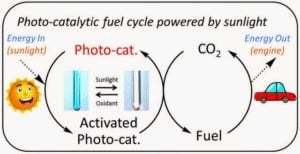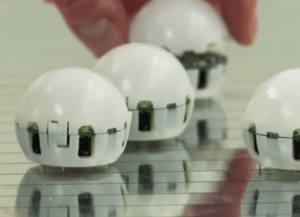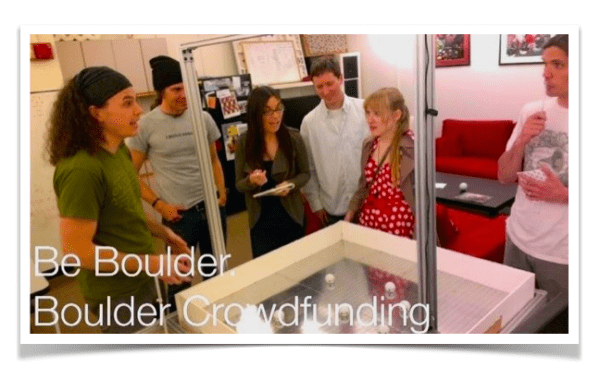Its no secret: the University of Colorado receives hundreds of millions of dollars in federal funds that sponsor our research. My lab alone racks up expenditures of $800,000 a year to pay for post-doc and graduate student salary, tuition, materials and travel. Isn’t it preposterous to now ask the public for some more of their hard-earned cash as we, and many other universities now, do on CU Boulder’s new initiative?
 It helps to first think about why the government actually does make these payments in the first place: to educate the next generation of engineers and scientists by working on research problems with important societal benefits. With this money becoming more competitive, the pool of ideas actually being supported becomes smaller with little to no feedback from the general public. Crowdfunding research allows the public to turn this around by enabling scientists to find support for projects currently not (or never) on the radar of conventional funding agencies, yet enjoying sufficient public interest. This category of research is probably the most obviously deserving of crowdfunding and has already enabled a host of documentaries, research excursions, and books, often by providing exclusively ideological or intellectual reward.
It helps to first think about why the government actually does make these payments in the first place: to educate the next generation of engineers and scientists by working on research problems with important societal benefits. With this money becoming more competitive, the pool of ideas actually being supported becomes smaller with little to no feedback from the general public. Crowdfunding research allows the public to turn this around by enabling scientists to find support for projects currently not (or never) on the radar of conventional funding agencies, yet enjoying sufficient public interest. This category of research is probably the most obviously deserving of crowdfunding and has already enabled a host of documentaries, research excursions, and books, often by providing exclusively ideological or intellectual reward.
 Government funding also imposes some restrictions on how students are being educated. While some of the monies I receive are in the form of grants where I can diverge from the original proposal as long as the sponsor is happy, this is not the case for contracts, which often need to be followed by the letter. As these monies usually come in response to a research proposal that I conceive and that fits into the trajectory of my research, little room is left for the students’ own ideas to turn into funded projects. Instead, crowdfunding can empower PhD students with direct access to funds they need to get their ideas of the ground. (A good example of the latter is the project by PhD student Chern-Hooi Lim to turn CO2 into fuel.) I expect this aspect of crowdfunding to massively increase the plurality of research being conducted in a university setting and providing unprecedented career development opportunities for the students who might become super-stars by following their own trajectories at a much earlier point than usual in an academic setting.
Government funding also imposes some restrictions on how students are being educated. While some of the monies I receive are in the form of grants where I can diverge from the original proposal as long as the sponsor is happy, this is not the case for contracts, which often need to be followed by the letter. As these monies usually come in response to a research proposal that I conceive and that fits into the trajectory of my research, little room is left for the students’ own ideas to turn into funded projects. Instead, crowdfunding can empower PhD students with direct access to funds they need to get their ideas of the ground. (A good example of the latter is the project by PhD student Chern-Hooi Lim to turn CO2 into fuel.) I expect this aspect of crowdfunding to massively increase the plurality of research being conducted in a university setting and providing unprecedented career development opportunities for the students who might become super-stars by following their own trajectories at a much earlier point than usual in an academic setting.
 As the government has other programs to fund K-12 education and museums, little to no funding is set aside in “research grants” for engaging in these activities as these focus on graduate education. Here, the National Science Foundation is an exception by requiring each proposal to have “broader impact”. Outreach activities at schools or museums are looked upon favorably, but these activities are always a diversion from the proposed research and therefore usually are only substantial parts of specific programs such as NSF Advancing Informal STEM Learning, which supports educational research (not outreach), or the NSF CAREER program that supports young professors to become teacher-scholars. This requires them to think broadly about the research they are doing, that is to think about their career not only from a scientific, but also from an educational perspective. Crowdfunding offers the opportunity to force professors out of the ivory tower and encourage them to engage into activities they otherwise could not, such as developing curricula for K-12 or exploring the artistic component of their research, “rewards” I’m offering in my campaign to create a large swarm of miniature robots that makes a “liquid that thinks”.
As the government has other programs to fund K-12 education and museums, little to no funding is set aside in “research grants” for engaging in these activities as these focus on graduate education. Here, the National Science Foundation is an exception by requiring each proposal to have “broader impact”. Outreach activities at schools or museums are looked upon favorably, but these activities are always a diversion from the proposed research and therefore usually are only substantial parts of specific programs such as NSF Advancing Informal STEM Learning, which supports educational research (not outreach), or the NSF CAREER program that supports young professors to become teacher-scholars. This requires them to think broadly about the research they are doing, that is to think about their career not only from a scientific, but also from an educational perspective. Crowdfunding offers the opportunity to force professors out of the ivory tower and encourage them to engage into activities they otherwise could not, such as developing curricula for K-12 or exploring the artistic component of their research, “rewards” I’m offering in my campaign to create a large swarm of miniature robots that makes a “liquid that thinks”.
Crowdfunding should therefore not be seen as replacing federal research funding, but as a complement that empowers the public to diverge their tax dollars into projects about which they actually care, personally support the next research breakthrough not yet on the government radar, or diverging a researcher’s activities to benefit their local community. Optimally, crowdfunding should always lead to something different than what tax dollars already accomplish, which at the very least is a personal dialog between the public and the researchers. (A tremendous example of a very intimate dialog is the American gut project.)
There is one important caveat in the crowdfunding euphoria, which might also turn into its biggest benefit: the public only funds things that it understands. Crowdfunding therefore forces scientists – maybe for the first time – to actually think very hard about what it actually is that they are doing and why anyone should care. This might be the biggest benefit for the public even if they keep their wallets closed.
________________________
 Nikolaus Correll is an assistant professor at the Department of Computer Science since August 2009 with courtesy appointments at the Department of Electrical, Computer and Energy Engineering and the Department of Aerospace Engineering at the University of Colorado at Boulder. He obtained a PhD from EPFL advised by Alcherio Martinoli in 2007, and spent two years at MIT CSAIL working with Daniela Rus as a post-doc. He wrote his master’s thesis at the Collective Robotics Group at the California Institute of Technology, Pasadena, CA. Nikolaus studied electrical engineering at the Technical University of Munich from 1998.
Nikolaus Correll is an assistant professor at the Department of Computer Science since August 2009 with courtesy appointments at the Department of Electrical, Computer and Energy Engineering and the Department of Aerospace Engineering at the University of Colorado at Boulder. He obtained a PhD from EPFL advised by Alcherio Martinoli in 2007, and spent two years at MIT CSAIL working with Daniela Rus as a post-doc. He wrote his master’s thesis at the Collective Robotics Group at the California Institute of Technology, Pasadena, CA. Nikolaus studied electrical engineering at the Technical University of Munich from 1998.



